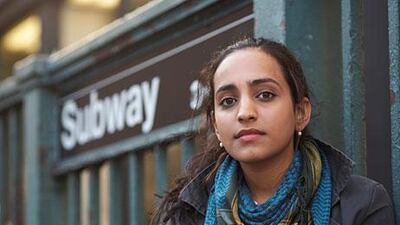While I was in one of the gorgeous reading rooms of Bryant Park library the other day trying to stay focused I suddenly heard the athan piercing through the silence. My first reaction was "Oh, is it already time for asr prayer?" and my second was to shuffle through all my belongings thinking it was coming from my phone or laptop. Nope. It was coming from the unattended bag to my left. People at the same table were looking around annoyed that someone's "ringtone" was disturbing the peace of the library. I was amused when the lady sitting across from me announced, "I think that's a call to prayer."
"Yes, it is," the guy sitting next to me and I responded at once. Of course, I thought it inconsiderate and thoughtless for someone to have left his or her belongings unattended - but the athan, which barely lasts five minutes, has never bothered me. If anything, it makes me feel at home. Of the world's major religions, Islam is probably one of the strictest when it comes to prayer, with five required daily prayers. Yet prayer is something that surpasses religious doctrine. Much like meditation, wishes or any sort of spirituality, it is accessible to anyone and everyone.
But I don't think people back in the Emirates or any Muslim country realise how wonderful it is to have prayer rooms available everywhere. Being able to do the five allocated prayers on time is something that becomes more important to me the older I get. In New York I sometimes have to wait to get home to pray. But in Abu Dhabi, whether you are in a mall or an office, finding a place for prayer couldn't be easier. This is why, this summer, I was slightly annoyed that the athan isn't prominent in malls in the UAE, that iqamaa was silenced in most neighbourhood mosques and that film schedules sometimes started right at salah time (if you've ever tried praying, then rushing to the cinema in Marina Mall, you know it's not the swiftest of treks). Although this is a trivial detail, I think that as a Muslim nation we can make small adjustments to help each other uphold the basic pillars of Islam - especially since they do not harm anyone and require only slight tweaks.
I don't expect the athan to be blasting around NYC anytime soon. The US is not a Muslim country and the city is probably too loud to hear it anyway. But I do think there should be more of an initiative to expose and share the different religious practices of the Muslim community. I encountered several Muslims in college who were scared to pray or show any sign of religious practice in front of their new roommates for fear of being looked upon as weird.
What always fascinates me is how normal Jewish holidays and practices are in New York, despite Judaism not being the dominant faith. I think a big part of this exposure comes from the media and pop culture. A huge number of American films and shows include a Jewish character or family. On the other hand, Muslims are still depicted - for the most part - as either immigrant comic characters or murderous villains.
The television show Bones now has a Muslim lab intern in it. In the show he prays five times a day. He initially fakes an accent in order to sound like he's fresh off the boat. He does this because he expects his colleagues would find it odd that he is both a scientist and religious. Although he is a minor character - and not without stereotypical flaws - baby steps like these that show Islamic prayer, fasting and even the hijab as normal can help ease the hostility that exists between people as a result of ignorance. And maybe the athan ringtone - in an appropriate setting - can help things along too.

